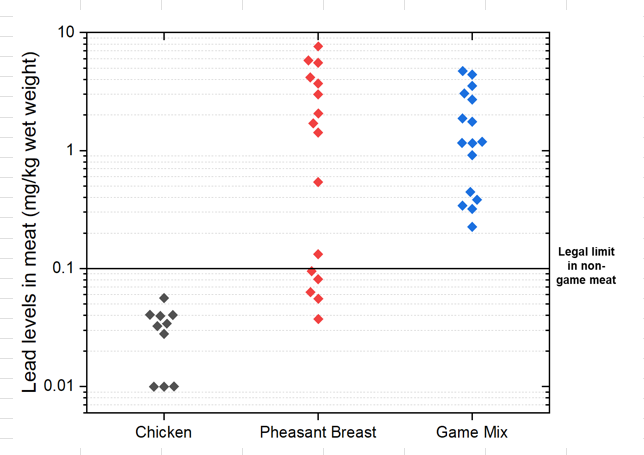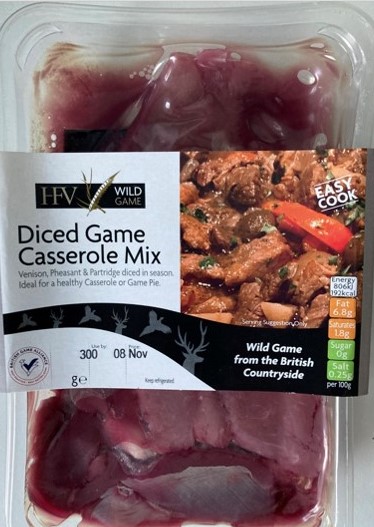Lead-contaminated game meat found for sale on Sainsbury’s shelves
British supermarket shelves are still stocked with potentially toxic game meat in the run up to Christmas, recent research by Wild Justice has found.
· Tests on packets of pheasant breast and mixed game meat from Sainsbury’s found lead levels at up to 76 times higher than the legal limit set for beef, pork, chicken etc.
· 100% of samples of mixed game meat tested positive for potentially dangerous amounts of lead.
· Findings indicate the voluntary phasing out of lead shot by the shooting industry hasn’t prevented lead contamination of meat nearly two years after its announcement.
Wild Justice, a not-for-profit organisation campaigning on British wildlife issues, bought 32 samples of pheasant breast and mixed game meat from Sainsbury’s stores (supplied by game dealer Holme Farmed Venison in Yorkshire) and had them tested for lead levels in November 2021. Ten samples of chicken meat were purchased and tested as controls.
Out of 16 samples of pheasant breast, 11 contained lead levels over the legal limit set for livestock meat. All 16 portions of the ‘Diced Game Casserole Mix’, containing venison, pheasant and partridge, exceeded the same level.

Currently (and inexplicably) there is no legal limit for lead levels in wild game meat such as pheasant, partridges, grouse and venison. The Maximum Level (ML) of lead for most types of farmed meat, such as chicken and beef, is set at 0.1 milligram per kilogram of wet weight of meat. The portions of mixed game meat sold by Sainsbury’s exceeded these by an average of 17 times, with some samples testing as high as 4.7mg/kg. Of the 11 pheasant breast samples that exceeded the threshold for other meats, the average was 32.5 times higher at 3.25mg/kg WW. The samples of chicken had uniformly low levels of lead, as expected, which were all well below the ML set for such meat.
Consumption of lead is detrimental to human health, being especially harmful to developing brains and the nervous system. Children, pregnant women and those trying to become pregnant are advised by the Food Standards Agency and NHS England against eating game shot with lead.
Although warnings about lead shot have been added to some of the packaging at Sainsbury’s this year, it was often not displayed clearly. Statements to the opposite effect, such as ‘Ideal for a healthy casserole or game pie’, are placed prominently on the products’ front. Wild Justice says this raises the question of how informed consumers of these products are about the risks of lead contamination. Both products were ‘kite-marked’ by the British Game Alliance which claims to be the ‘official marketing board for the UK game industry’ offering ‘traceability and credibility’, although this has been questioned repeatedly.

Lead shot is a type of ammunition normally used for shooting pheasants, partridges and grouse. The small lead pellets are malleable and when shot into an animal they fragment, dispersing tiny pieces of lead through the animal’s flesh. It’s impossible to remove all of these tiny fragments, leading to lead contamination of the meat. Lead bullets used for shooting deer cause similar problems, with fragmentation of the bullet distributing small pieces of lead in the venison meat. Non-toxic ammunition such as steel is widely available at comparable prices to lead ammunition.
Wild Justice said: “The presence of lead-contaminated meat on supermarket shelves is disgraceful. It’s a clear failure of the regulatory system that government allows the sale of lead-contaminated meat, without prominent health warnings, when the FSA and NHS England warn of the dangers of eating such food. Sainsbury’s know their game meat has high lead levels but appear to be putting profit ahead of safety because of a regulatory loophole.
“In the run up to Christmas, when people are thinking about festive dishes for the family table, it’s outrageous that products like this can be sold under the guise of being healthy due to failures of government and retailers to act in the public interest.”
In 2020 a voluntary five-year phase out of lead shot was announced by prominent organisations within the shooting industry. Wild Justice says this move is ineffective and calls for an outright ban on use of lead shot. “There’s no point leaving this matter to the shooting industry – they have failed to act for years“, said Wild Justice.
Wild Justice analysed similar samples of game meat from Sainsbury’s stores shot in the 2020/21 shooting season and found high levels of lead in them; Sainsbury’s appears to have done nothing to reduce the levels of lead in game meat sold in its stores in the interim.
Waitrose is the leading supermarket which has recognised the need for change, and introduced labelling of game meat, warning of lead levels, in 2019/20 and is aiming to source lead-free game meat as soon as possible. Wild Justice has collected samples from Waitrose stores this year (and a number of other shops) and these are currently undergoing analysis.
Wild Justice is a not-for-profit organisation set up by Chris Packham, Ruth Tingay and Mark Avery. We are entirely dependent on donations. To support our work – click here. To hear more about our campaigns and legal cases subscribe to our free newsletter – click here.
